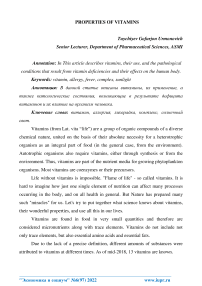Properties of vitamins
Автор: Tuychiyev G.U.
Журнал: Экономика и социум @ekonomika-socium
Рубрика: Основной раздел
Статья в выпуске: 6-1 (97), 2022 года.
Бесплатный доступ
In This article describes vitamins, their use, and the pathological conditions that result from vitamin deficiencies and their effects on the human body.
Vitamin, allergy, fever, complex, sunlight
Короткий адрес: https://sciup.org/140298891
IDR: 140298891
Текст научной статьи Properties of vitamins
Vitamins (from Lat. vita “life”) are a group of organic compounds of a diverse chemical nature, united on the basis of their absolute necessity for a heterotrophic organism as an integral part of food (in the general case, from the environment). Autotrophic organisms also require vitamins, either through synthesis or from the environment. Thus, vitamins are part of the nutrient media for growing phytoplankton organisms. Most vitamins are coenzymes or their precursors.
Life without vitamins is impossible. "Flame of life" - so called vitamins. It is hard to imagine how just one single element of nutrition can affect many processes occurring in the body, and on all health in general. But Nature has prepared many such "miracles" for us. Let's try to put together what science knows about vitamins, their wonderful properties, and use all this in our lives.
Vitamins are found in food in very small quantities and therefore are considered micronutrients along with trace elements. Vitamins do not include not only trace elements, but also essential amino acids and essential fats.
Due to the lack of a precise definition, different amounts of substances were attributed to vitamins at different times. As of mid-2018, 13 vitamins are known.
Some information about vitamins that we are accustomed to in everyday life, in fact, turn out to be incorrect. Therefore, before you start taking it, you need to study both common misconceptions and useful facts about vitamins.
Lots of vitamins - always useful. You can often hear the opinion that the more vitamins you take, the better. In reality, this turns out not to be the case. Interesting facts about vitamins confirm that it is important to strictly observe the necessary dosages. After all, an excess of these substances is sometimes more dangerous than a lack. It is not for nothing that doctors emphasize that beriberi can cause a weakening of the body and various diseases, but in no case do they call for mindlessly absorbing tons of pharmaceutical products. For example, the well-known, useful and seemingly safe vitamin C, interesting facts about which they say, it turns out that its excess is very harmful. It can cause high blood pressure and temperature, impaired kidney function and insomnia, and even reduced insulin production. Based on this, in no case should even the most famous vitamins be abused without thoroughly studying their required dosage.
Allergy to vitamins. A common mistake moms make is diagnosing “vitamin allergy” without testing. Such mothers forget that various flavors, dyes and additives are used in multicomponent vitamin complexes - they are often the cause of allergies.
With proper nutrition, synthetic vitamins are not needed. Properly balanced nutrition with plenty of vegetables and fruits is undoubtedly very good. However, modern fruits and vegetables are not nearly as rich in vitamins as we would like. Due to the depletion of soils and the use of large amounts of fertilizers, they do not fully provide the body with useful substances. Therefore, well-chosen vitamin complexes should be present in every family.
Consider the most essential vitamins and interesting facts about them.
-
• In vegetables, as you know, a lot of useful substances. However, do not store them for a long time either in the refrigerator or at room temperature, because after a few days the amount of vitamins in them will decrease significantly. Approximately 30%.
-
• Vitamin A is very useful, many mothers should know interesting facts about it. For example, it is noteworthy that it is destroyed under the influence of ultraviolet radiation. In addition, it is afraid of any heat treatment.
-
• Interesting facts about vitamin C: if people had not lost the ability that they had millions of years ago, they could, like other animals, synthesize it themselves. But now we have to take this useful element with food.
-
• Group B includes vitamins, the facts about which are also interesting. The least we need is vitamin B12. B1 should be consumed by those who do not tolerate flights and sea travel, there is a lot of it in plant products. With the predominance of protein foods in the diet, it is worth paying special attention to vitamin B6. And B2 is destroyed by the sun's rays. There is no maximum limit for consumption vitamins, but only if a person receives them from live fruits and raw vegetables. The more natural vitamins, the better for health. The disease occurs only when vitamins are not given in combination.
Список литературы Properties of vitamins
- Кетрин Прайс. Витомания. М.:-2015. 490 ст.
- Майя Гогулан. Чудеса витаминов и микроэлементов. Законы здоровья. "Русский шахматный дом" 2013.
- Bellows L, Moore R. "Water-Soluble Vitamins". Colorado State University. Archived from the original on 25 September 2015. Retrieved 7 December 2008.


